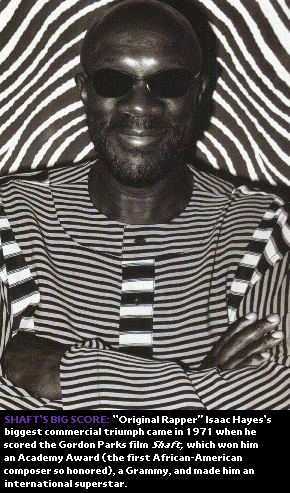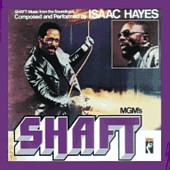|
"Theme From 'Shaft'" Isaac Hayes Enterprise 9038 Oct. 1971 Billboard: #1
Before "Theme from Shaft," Hayes's work was a bit more conventional though no less captivating. His career began as a session musician at Stax Records in Memphis, where he played keyboards and occasional saxophone on hit records by the likes of Otis Redding and Eddie Floyd. He soon began collaborating with wordsmith David Porter, and they eventually supplied the label with a seemingly endless stream of hit records. Besides writing for Carla Thomas ("B-A-B-Y"); her father, Rufus Thomas; Johnnie Taylor; and Mable John, the sister of legendary Little Willie John ("Your Good Thing Is About to End"), they wrote most of their biggest hits for Sam and Dave. "Soul Man," "Hold On, I'm Comin'," "When Something Is Wrong with My Baby," "I Thank You," and "Wrap It Up" are only a few of the well-known hits they penned. Stax began the Enterprise label as a vehicle for Hayes to begin a solo career, but it wasn't until the unlikely success of his Hot Buttered Soul album in 1969 that his recording career began to get under way. As the story goes, Stax's corporate parent, Gulf+Western, commissioned a study to compare the profitability of albums as opposed to singles. As a direct result of this, it immediately sanctioned Stax to concentrate on album releases. Stax issued no fewer than twenty-eight albums simultaneously. For a number of reasons, Hot Buttered Soul was determined to be the least likely to sell. It contained only four titles, all of which were alternate versions of familiar material recorded with leftover studio time, and it lacked star appeal. Instead, it blew the other albums away and became one of the most popular records in Stax history. An eighteen-plus-minute recording of "By the Time I Get to Phoenix" was chosen for single release, and both this song and its B side, "Walk on By," reached the Top 40 in severely edited form. It was a strange and surprising phenomenon, but their unique combination of middle-of-the-road pop, extended soul rapping, and rhythmic orchestration made them stand out as thoroughly different from anything else on the charts. "Never Can Say Goodbye" repeated the formula, though it was released only weeks after the Jackson 5's smash version, and reached #22. "Theme from Shaft" cemented Hayes's popularity and forever cast him as the bald and bearded black love man extraordinaire, always shirtless and draped in chains. In time, the image of singer as sex god/white slave trader would be reduced to parody, but in 1971, it was both provocative and titillating. Hayes would go on to become the self-proclaimed "Black Moses" before filing for bankruptcy, a complication that seemed to bring his career to a grinding halt, until it was once revived again in the '90s. Hayes passed away on Aug. 10, 2008, in Memphis after being found unconscious near a treadmill in his home. He was 65. - Thomas Ryan, American Hit Radio, Prima Entertainment, 1996.
No comments so far, be the first to comment. |


